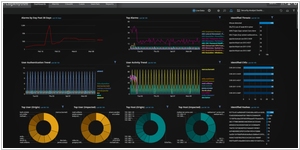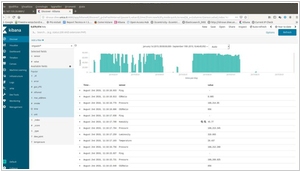ElasticSearch vs LogRhythm
August 06, 2023 | Author: Michael Stromann
15

LogRhythm SIEM platform allows to protect critical data and infrastructure with confidence. Defending your enterprise comes with great responsibility. With intuitive, high-performance analytics and a seamless incident response workflow, your team will uncover threats faster, mitigate risks more efficiently, and produce measurable results.
See also:
Top 10 Big Data platforms
Top 10 Big Data platforms
Elasticsearch and LogRhythm are both powerful solutions used for log management and analysis, but they have distinct differences in their functionalities and use cases.
Elasticsearch, as mentioned earlier, is an open-source distributed search and analytics engine. It excels at indexing and querying large volumes of structured and unstructured data in real-time. Elasticsearch is commonly used for log aggregation, application monitoring, and full-text search. It is a versatile platform that provides fast data retrieval and exploration, making it suitable for various data analytics use cases.
LogRhythm, on the other hand, is a comprehensive security information and event management (SIEM) platform. Its primary focus is on cybersecurity and threat detection. LogRhythm offers advanced capabilities to collect, analyze, and correlate security-related data from different sources, enabling proactive threat detection and incident response. It provides real-time event correlation, anomaly detection, and security analytics, allowing security teams to monitor and respond to potential threats effectively. Additionally, LogRhythm supports compliance management, making it a valuable tool for organizations seeking to meet regulatory requirements.
See also: Top 10 Big Data platforms
Elasticsearch, as mentioned earlier, is an open-source distributed search and analytics engine. It excels at indexing and querying large volumes of structured and unstructured data in real-time. Elasticsearch is commonly used for log aggregation, application monitoring, and full-text search. It is a versatile platform that provides fast data retrieval and exploration, making it suitable for various data analytics use cases.
LogRhythm, on the other hand, is a comprehensive security information and event management (SIEM) platform. Its primary focus is on cybersecurity and threat detection. LogRhythm offers advanced capabilities to collect, analyze, and correlate security-related data from different sources, enabling proactive threat detection and incident response. It provides real-time event correlation, anomaly detection, and security analytics, allowing security teams to monitor and respond to potential threats effectively. Additionally, LogRhythm supports compliance management, making it a valuable tool for organizations seeking to meet regulatory requirements.
See also: Top 10 Big Data platforms




